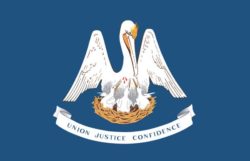Jean-Michel de Lépinay
Jean-Michel de Lépinay served as the fifth governor of Louisiana from 1717 to 1718.
Jean-Michel de Lépinay served as the fifth governor of Louisiana from 1717 to 1718, a mostly undistinguished term that separated two periods when the colony was under the control of Jean Baptiste Le Moyne, Sieur de Bienville.
Jean-Michel de Lépinay (also spelled l’Epinay) was born in Fougères, Brittany, France, around 1665. He joined the navy in 1683; in 1687 he accompanied French forces to Canada, where he earned several promotions and served as honorary port captain of Québec. After returning to France, Lépinay was assigned to the port of Rochefort and was promoted to lieutenant commander in 1705. Through patronage of the comte de Toulouse, who was head of the Conseil de la Marine, Lépinay secured appointment as the governor of Louisiana in March 1716. He left France in December and reached Mobile on March 9, 1717, bringing with him fifty colonists and three companies of infantry. At that time, seven hundred subjects of the French crown inhabited the colony in addition to the Native American population. Besides the colonial headquarters on Mobile Bay, settlements had been established at or near the present-day sites of Alexandria and Natchitoches as well as Biloxi and Natchez, Mississippi.
Lépinay’s short term in office was filled with almost constant wrangling among various royal officials, most notably Bienville. The previous governor, Antoine de La Mothe, Sieur de Cadillac, had been dismissed largely because Bienville had done everything in his power to undermine Cadillac. Bienville served as governor (his second term), but only in the interim until Lépinay could arrive, and he smarted at having been passed over for the permanent position.
Lépinay’s most controversial move while in office was to ban the sale of alcohol to the Native Americans; in the struggling colony, this trade had been the most profitable. Antoine Crozat—a merchant and financier in France who had been granted a fifteen-year monopoly on the commerce of Louisiana in 1712—had decided by this time that the land would never yield the profits he had hoped for. Crozat was relieved of his burden in 1717, and the colony’s trading rights were transferred to the Company of the West. Because of Louisiana’s financial troubles and the continuing discord among officials—Bienville foremost—Lépinay was recalled to France in February 1718, leaving Bienville in charge again.
Shortly before leaving Mobile, Lépinay was notified of his nomination as governor of Grenada. Before accepting his new position, he was forced to defend himself in France against charges of corruption and malfeasance in office. Exonerated of all charges, Lépinay began his term as governor of Grenada in June 1720; he died just six months later, on January 3, 1721, while visiting the governor of the French West Indies in Martinique.
Adapted from Brian E. Coutts’s entry for the Dictionary of Louisiana Biography, a publication of the Louisiana Historical Association in cooperation with the Center for Louisiana Studies at the University of Louisiana, Lafayette.
